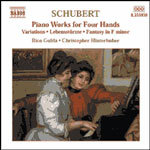
Piano Works for Four Hands, Vol. 4 (Includes Fantasie in F minor, D. 940 )
 $25.00
Out of Stock
$25.00
Out of Stock6+ weeks add to cart
SCHUBERT
Piano Works for Four Hands, Vol. 4 (Includes Fantasie in F minor, D. 940 )
Rico Gulda, piano / Christopher Hinterhuber, piano
[ Naxos / CD ]
Release Date: Thursday 17 June 2004
This item is currently out of stock. It may take 6 or more weeks to obtain from when you place your order as this is a specialist product.
"Rico Gulda and Christopher Hinterhuber endow these four handed works with emergent Romantic characteristics. A stimulating disc."
- Classical Sound and Vision, February 2003
Franz Schubert was born in Vienna in 1797, the son of a schoolmaster, and spent the greater part of his short life in the city. His parents had settled in Vienna, his father moving there from Moravia in 1783 to join his schoolmaster brother at a school in the suburb of Leopoldstadt and marrying in 1785 a woman who had her origins in Silesia and was to bear him fourteen children. Franz Schubert was the twelfth of these and the fourth to survive infancy. He began to learn the piano at the age of five, with the help of his brother Ignaz, twelve years his senior, and three years later started to learn the violin, while serving as a chorister at Liechtental church. From there he applied, on the recommendation of Antonio Salieri, to join the Imperial Chapel, into which he was accepted in October 1808, as a chorister now allowed to study at the Akademisches Gymnasium, boarding at the Stadtkonvikt, his future education guaranteed.
During his schooldays Schubert formed friendships that he was to maintain for the rest of his life. After his voice broke in 1812, he was offered, as expected, a scholarship to enable him to continue his general education, but he chose, instead, to train as a primary school teacher, while devoting more time to music and, in particular, to composition, the art to which he was already making a prolific contribution. In 1815 he joined his father as an assistant teacher, but showed no great aptitude or liking for the work. Instead he was able to continue the earlier friendships he had formed at school and form new acquaintances. His meeting in 1816 with Franz von Schober allowed him to accept an invitation to live in the latter's apartment, an arrangement that relieved him of the necessity of earning his keep in the schoolroom. In August 1817 he returned home again, when room was needed by Schober for his dying brother, and resumed his place, for the moment, in the classroom. The following summer he spent in part at Zseliz in Hungary as music tutor to the two daughters of Count Johann Karl Esterházy von Galánta, before returning to Vienna to lodge with a new friend, the poet Johann Mayrhofer, an arrangement that continued until near the end of 1820, after which Schubert spent some months living alone, now able to afford the necessary rent.
By this period of his life it seemed that Schubert was on the verge of solid success as a composer and musician. Thanks to his friends, in particular the older singer Johann Michael Vogl, Leopold von Sonnleithner and others, his music was winning an audience. There was collaboration with Schober on a new opera, later rejected by the Court Opera, but in other respects his name was becoming known as a composer, beyond his immediate circle. He lodged once again with the Schobers in 1822 and 1823 and it was at this time that his health began to deteriorate, through a venereal infection that was then incurable. This illness overshadowed the remaining years of his life and was the cause of his early death. It has been thought a direct consequence of the dissolute way of life into which Schober introduced him and which for a time alienated him from some of his former friends. The following years brought intermittent returns to his father's house, and a continuation of social life that often centred on his own musical accomplishments and of his intense activity as a composer. In February 1828 the first public concert of his music was given in Vienna, an enterprise that proved financially successful, and he was able to spend the summer with friends, including Schober, before moving, in September, to the suburb of Wieden to stay with his brother Ferdinand, in the hope that his health might improve. Social activities continued, suggesting that he was unaware of the imminence of his death, but at the end of October he was taken ill at dinner and in the following days his condition became worse. He died on 19th November.
Tracks:
Variations in B flat major, D. 968A (D. 603)
Rondo in A major, D. 951
Duo in A minor, Allegro, D. 947, "Lebenssturme"
Divertissement uber franzosische in B minor Motive:
Andantino Varie, D. 823/II
Fantasie in F minor, D. 940


